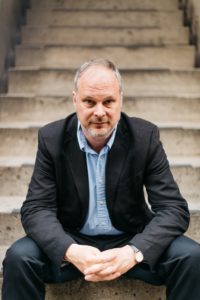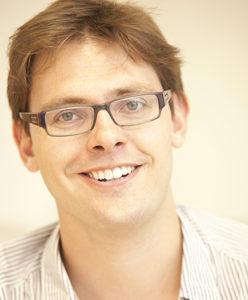
Introducing your new ALCS board members
We are pleased to introduce writers Michael Ridpath and Tom Chatfield, both of whom have joined the ALCS Board.
Michael Ridpath
 Michael Ridpath has written fifteen novels: eight financial thrillers, four Icelandic crime novels, two spy novels and a stand-alone thriller, Amnesia. He has been a member of the Management Committee and the Finance Committee of the Society of Authors, he was Vice Chair of the Crime Writers’ Association and is currently Treasurer of the Royal Literary Fund.
Michael Ridpath has written fifteen novels: eight financial thrillers, four Icelandic crime novels, two spy novels and a stand-alone thriller, Amnesia. He has been a member of the Management Committee and the Finance Committee of the Society of Authors, he was Vice Chair of the Crime Writers’ Association and is currently Treasurer of the Royal Literary Fund.
Tell us something about yourself, and what you write.
I started off my career as a banker working in the City. When I was 29 I decided to write a thriller, Free to Trade, about a 29-year-old trader working in the City, which to my astonishment was picked up with enthusiasm by publishers all over the world. I became a full-time author and wrote seven more financial thrillers. Then, when publishers became less enthusiastic about my financial thrillers, I changed direction, writing a couple of spy novels set at the beginning of the Second World War and a crime series featuring an Icelandic detective named Magnus.
What skills and perspectives do you hope to bring to the ALCS Board?
I know about writing books, I know about investing money, and I have served on a number of committees, including the Royal Literary Fund (RLF), the Society of Authors (SoA) and The Crime Writers’ Association. As a Treasurer of the RLF for 17 years, I have been responsible for the investment of the fund’s £170 million endowment. I have experienced the highs and lows of a career as a full-time author, and have been willing to reinvent myself a number of times, for example I self-publish several of my novels through Kindle. So I hope I will be able to help oversee the financial management of ALCS and its investments, and also assist it in reacting to and anticipating changes in the publishing world.
What do you regard as the most pressing issues for writers and for ALCS in 2017?
The digital revolution means that each year there are more books published, more authors writing them and less profit to share round. Individual writers need to decide whether to write in the same way and accept a lower income – a reasonable choice for many – or to adapt and change. Wishing for the world to stand still will not work. Working out how to adapt and change is difficult.
ALCS’s challenge is to keep on top of these changes as they occur and to anticipate what will change in the future in relation to copyright and how to make money from it. There can be opportunities: a digital market place is one where it is possible to count small uses of copyright and to pay for them, but only through organisations with the scale and expertise of ALCS.
What are your own current writing projects?
I have just published my first stand-alone thriller for a while, Amnesia, about an old man living by a loch in Scotland who falls, hits his head, and loses his memory. He wakes up to discover that he killed the only woman he ever loved. The novel is published by Atlantic Books in the UK, but I am self-publishing it in the US. And I am just finishing the first draft of my next Magnus crime novel, The Wanderer, set in Iceland and Greenland.
And please tell us something about your own cultural preferences: film, TV, theatre, music?
I have always hated this question: I’m not sure whether it’s because I have genuinely eclectic tastes, or whether I feel the need to come up with something that sounds cool or clever. But the truth is I am currently binge-watching a mammoth box-set of LA Law, which is neither cool nor clever.
Oh, and I love Iceland and all things Icelandic: the people, the language, the literature and especially the bleak, beautiful and violent landscape.
Tom Chatfield
 Dr Tom Chatfield is a British writer, broadcaster and tech philosopher. He is the author of six books exploring digital culture, most recently Live This Book! (Penguin), How to Thrive in the Digital Age (Pan Macmillan) and Netymology (Quercus). He was also recently a Visiting Associate at the Oxford Internet Institute, researching a new book on critical thinking.
Dr Tom Chatfield is a British writer, broadcaster and tech philosopher. He is the author of six books exploring digital culture, most recently Live This Book! (Penguin), How to Thrive in the Digital Age (Pan Macmillan) and Netymology (Quercus). He was also recently a Visiting Associate at the Oxford Internet Institute, researching a new book on critical thinking.
Tell us something about yourself, and what you write.
I’m a bit of a geek with a background spanning literature, philosophy and technology, and I mostly write non-fiction exploring digital culture: everything from video games, politics and language change in a digital age to the evolution of AI. I divide my time between writing, broadcasting, and working with a variety of companies exploring what it means to use technology well – which means looking as closely at people as it does machines.
What skills and perspectives do you hope to bring to the ALCS Board?
I’m interested in digital transformation, and in locating it in a human context: looking at people’s actual behaviour, interests and needs, and seeing how technology can serve and respect these. As a writer and someone who is passionate about the power of words, I want to help authors get to grips with the challenges of new media, formats, audiences and opportunities – and the ongoing articulation of underlying values in the middle of all this change.
What do you regard as the most pressing issues for writers and for ALCS in 2017?
The ways in which people read, study and teach are being transformed by technology – and ALCS is at the heart of the collective negotiations that will ensure digital-first approaches continue to respect and to reward creators of all kinds, while also making work accessible in new ways. There’s also a huge challenge around the digitisation of archives and back catalogues, and not only tracking huge volumes of data but also making it transparent, accessible and useful to authors, publishers and readers alike.
What are your own current writing projects?
My next book will be a textbook for the social science publisher SAGE, exploring critical thinking in a digital age. It’s my seventh book, but my first textbook, and I’m hugely excited about the chance to write something accessible and lucid that – I hope – will help students of all kinds think, read and engage more rigorously with the torrents of information they face every day.
And please tell us something about your own cultural preferences: film, TV, theatre, music?
I’m a keen pianist, and I love playing baroque and jazz piano at home while writing – and listening to as much Beethoven played by Barenboim and Bach played by Glenn Gould as I can manage around the domestic demands of my two young children!
